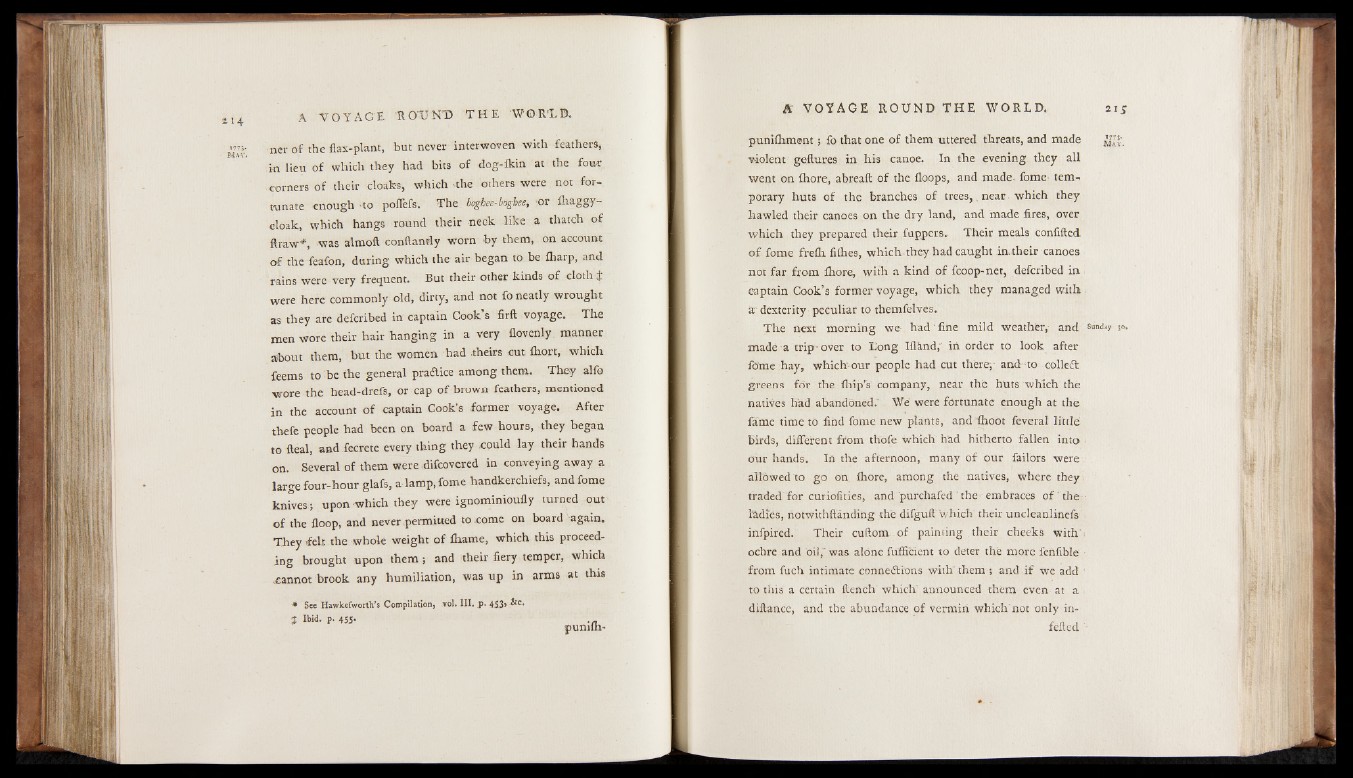
n e r of the flax-plant, but never interwoven -with feathers,
in lieu of which they had bits of dog-fkin at the four
corners of their cloaks, which -the others were not fortunate
enough -to poflefs. The. boghee-boghee, -or fhaggy-
cloak, which hangs round their neck like a thatch of
ftraw*, was almoft conftantly worn by them, on account
of the feafon, during which the air began to be (harp, and
rains were very frequent. But their other kinds of cloth J
were here commonly old, dirty, and not fo neatly wrought
as they are defcribed in captain Cook s firft voyage. The
men wore their hair hanging in a very flovenly manner
about them, but the women had .theirs cut fhort, which
feems to be the general praftice among them. They alfo
■ wore the head-drefs, or cap of brown feathers, mentioned
in the account of captain Cook’s former voyage. After
thefe people had been on board a few hours, they began
to fteal, and fecrete every thing they .could lay their hands
on. Several of them were,difcovered in conveying away a
large four-hour glafs, a lamp, fome handkerchiefs, and fome
knives -, upon which they were ignominioufly turned out
of the floop, and never .permitted to come on board -again.
They -felt the whole weight of fharne, which this proceeding
brought upon them ; and their fiery temper, which
cannot brook any humiliation, was up in arms at this
* See Hawkefworth’s Compilation, vol. I ll , ,p. 453> ^ c-
1 Ibid. p. 453. punifli-
2 1S
puniihment ; fo that one of them uttered threats, and made S *
violent geftures in his canoe. In the evening they all
went on fhore, abreaft of the Hoops, and made, fome- temporary
huts of the branches of trees,, near which they
bawled their canoes on the dry land, and made fires, over
which they prepared their fuppers.. Their meals confifted.
of fome frefh fithes, which they had caught in. their canoes
not far from fhore, with a kind of fcoop-net, defcribed in
captain Cook’s former voyage, which they managed with
a-dexterity peculiar to themfelves.
The next morning we- had'fine mild weather, and Sunday 30.
made a trip-over to Long Iflànd,' in order to look after
fome hay, which our people had cut there, and-to collect
greens for the fhip’s company, near the huts which the
natives had abandoned. We' were fortunate enough at the
fame time to find fome new plants, and fhoot feveral little
birds, different from thofe which had hitherto fallen into
our hands. In the afternoon, many of our failors were
allowed to go on fhore, among thé natives, where they
traded for curiofities, and purchafed the embraces of thé
ladies, notwithftanding the difguft which their uncleanlinefs
infpired. Their cuftom of painting their cheeks with ;
ochre and oil,' was alone fufficient to deter the more fenfible
from fuch intimate connexions with them-, and if we add
to this a certain flench which announced them even at a
diftance, and the abundance of vermin which'not only infefted